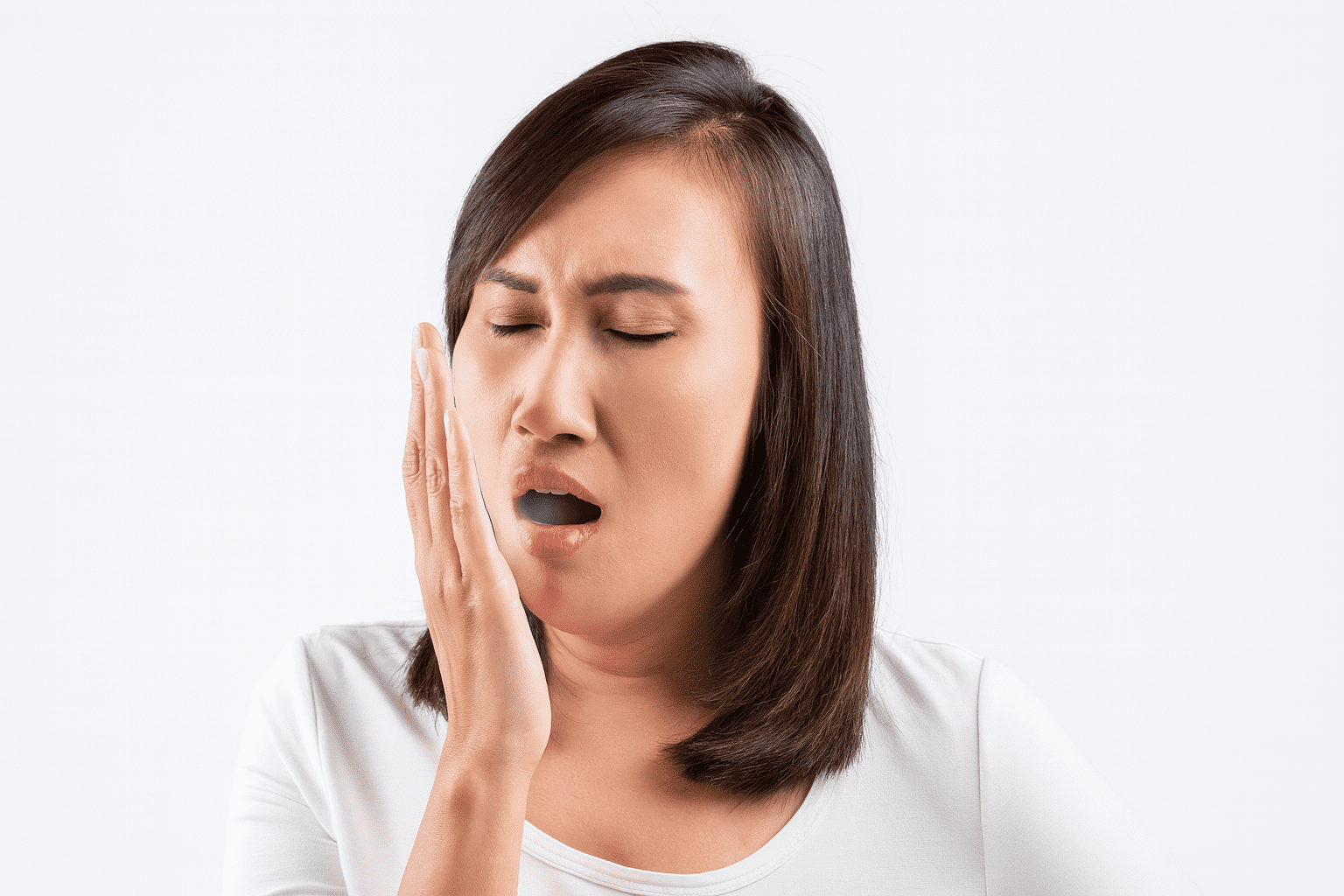Halitosis – Causes, Signs & How to Stop Bad Breath
Bad breath, medically called halitosis, affects millions of people worldwide. It can be uncomfortable, embarrassing, and sometimes indicate underlying oral or health issues. Occasional bad breath after eating certain foods is normal, but persistent halitosis requires attention.
At First Choice Dental, we understand that patients want clear guidance on managing bad breath safely and effectively. This article explains the causes, signs, and solutions for halitosis, including practical tips, home remedies, and professional care for bad breath treatment in Narellan. We also cover preventative measures to help maintain fresh breath and a healthy mouth over time.
What Causes Halitosis?
Halitosis usually originates in the mouth, but sometimes other parts of the body contribute. Understanding the causes helps you target the right solution.
Addressing halitosis early can save you from embarrassment and boost your confidence in social settings. Regular dental check-ups and a proper oral care routine play an important role in keeping your breath fresh.
If bad breath persists despite good oral hygiene, it’s a good idea to visit a dental professional. They can assess the situation and recommend treatments that target the root of the problem.
Here are some of the most common reasons behind bad breath.
Knowing them can help you choose the right treatment and prevent it in the future.
1. Diet and Lifestyle
Strong-smelling foods like garlic, onions, and spices can linger in the breath. Smoking and alcohol use worsen dryness and bacterial growth. Limiting these foods and quitting smoking can help prevent halitosis.
2. Tongue Coating
A coated tongue, especially at the back, is a common source of bad breath. Bacteria and food debris trapped there release foul odours. Regular tongue cleaning with a scraper or soft toothbrush can make a significant difference.
3. Dry Mouth (Xerostomia)
Saliva naturally cleanses the mouth. Reduced saliva flow, due to dehydration, medications, or certain health conditions, allows bacteria to thrive. Chewing sugar-free gum and drinking water frequently can help maintain saliva flow.
4.Oral Hygiene issue
Poor brushing or flossing allows food particles and bacteria to accumulate on teeth, gums, and the tongue. This buildup produces compounds that cause unpleasant odours. Consistent cleaning is key to reducing halitosis.
5. Dental Conditions
Cavities, gum disease, or poorly fitted dental appliances can contribute to persistent halitosis. Regular dental check-ups in Narellan ensure these issues are detected and treated early.
6. Health-Related
Causes Sometimes halitosis is linked to sinus infections, respiratory problems, digestive conditions, or other systemic issues. Persistent bad breath that doesn’t improve with oral care should be evaluated by a healthcare professional.
Signs of Halitosis (Bad Breath)
Halitosis isn’t always easy to notice on your own. Look for:
- Persistent bad taste in the mouth
- Noticeable odour when speaking
- Dry or sticky mouth
- Coating on the tongue
- Frequent thirst
Early recognition allows for timely intervention, preventing embarrassment and maintaining oral health. Regular check-ups with a dentist in Narellan can help identify these signs before they become severe.
How to Stop Bad Breath
Most halitosis cases can be managed effectively with consistent oral care, lifestyle changes, and professional support.
1. Maintain Excellent Oral Hygiene
- Brush teeth at least twice daily with fluoride toothpaste
- Floss daily to remove trapped food
- Clean your tongue using a scraper or soft brush
- Use an antibacterial mouthwash to reduce odour-causing bacteria
Proper oral hygiene is the foundation for fresh breath and overall dental health.
2. Stay Hydrated
Drinking water regularly helps maintain saliva flow. Chewing sugar-free gum can also stimulate saliva production and naturally freshen breath. Staying hydrated throughout the day is especially important for people who work in dry environments or spend long hours speaking.
3. Monitor Your Diet
Limit foods that leave strong odours. Reduce sugary snacks and beverages that promote bacterial growth. Include fresh fruits and vegetables, which not only improve oral health but also aid in maintaining fresh breath naturally.
4. Use Safe Halitosis Remedies
Some simple halitosis remedies can complement good oral hygiene:
- Rinsing with saltwater or baking soda solutions occasionally
- Using a tongue scraper daily to remove debris
- Choosing mouth rinses formulated for fresh breath
- These measures can help manage mild cases of bad breath effectively at home.
5. Seek Professional Halitosis Treatment
For persistent halitosis, professional care is key. Dentists at First Choice Dental in Narellan provide personalised treatment tailored to the underlying cause. Treatments may include:
- Professional teeth cleaning to remove plaque and tartar
- Addressing gum disease or cavities
- Guidance on specialised rinses or oral care products
In some cases, persistent halitosis may require medical evaluation beyond dentistry to rule out sinus, digestive, or systemic causes.
Daily Habits to prevent Bad Breath
- Quit smoking and reduce alcohol consumption
- Limit caffeine intake, which can dry out the mouth
- Eat a balanced diet with fibrous foods
- Replace toothbrushes every 3–4 months
- Maintain regular dental checkups for monitoring
Simple daily habits, combined with professional guidance, can keep halitosis under control and improve overall oral health.
Halitosis is a common but manageable condition. With proper oral hygiene, lifestyle habits, and professional care at First Choice Dental, we provide effective bad breath treatment in Narellan so you can regain fresh breath and confidence. Understanding the causes and early signs is key to effective management.
If bad breath has been bothering you, professional care can make all the difference. Schedule a consultation with our dentist in Narellan to explore proven halitosis remedies and treatments for lasting freshness.
FAQ
Can halitosis indicate serious health problems?
Yes. While most cases are caused by oral issues, persistent halitosis can sometimes indicate conditions like sinus infections, diabetes, or digestive disorders. Professional evaluation is important.
What’s the difference between halitosis remedies, cure, and treatment?
- Halitosis remedies: Home measures to reduce bad breath
- Halitosis cure: Solutions targeting the root cause
- Halitosis treatment: Professional dental care for persistent cases
When should I see a dentist for bad breath?
If halitosis persists for more than a few weeks despite proper oral hygiene, consulting a dentist who can provide effective halitosis treatment in Narellan is recommended. Early intervention ensures accurate diagnosis and effective treatment.
Can a cosmetic dentist help with bad breath?
Yes. A cosmetic dentist in Narellan can address dental issues such as cavities, gum disease, or poorly fitted restorations that contribute to halitosis while also improving the appearance of your smile.
Are home remedies enough to stop halitosis permanently?
Mild cases may improve with home remedies, but persistent bad breath usually requires professional guidance and treatment to address the underlying cause effectively.
Book an Appointment
by calling us on 02 4647 4570
Our Location
Suite 3, 20 Somerset Ave Narellan NSW 2567
Connect with Us
©2008- First Choice Dental. All right reserved. Narellan Dentist



